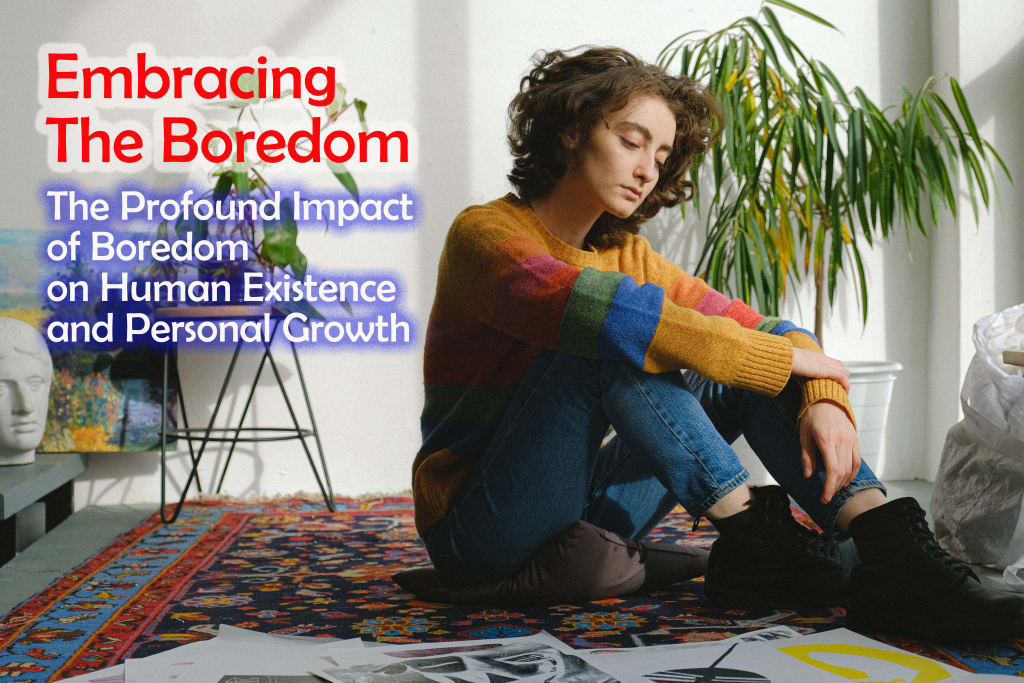Embracing the Boredom
The Profound Impact of Boredom on Human Existence and Personal Growth

Action and danger may be exciting, but there's something to be said about the process of "boring" – enlarging a hole, like the barrel of a gun. Boring, in this context, involves slow and repetitive movements that give the term its common association with dullness and disinterest. However, the concept of boredom goes far beyond a mere lack of excitement; it delves into the essence of human existence and raises intriguing questions about our desires and needs.
Boredom is not a modern invention. Historical evidence from ancient Pompeii reveals that humans have experienced this sensation since time immemorial. Although boredom may seem trivial or embarrassing, it carries a profound significance in our lives. This uninvited feeling forces us to confront our thoughts and feelings, making us delve deeper into our inner selves. Boredom can even be a source of creativity and self-awareness.
Contrary to its name, boredom is anything but boring. Neurological studies have shown that when bored, brain activity only drops by about 5%, and individuals exhibit increased engagement in regions responsible for imagination and introspection. The state of boredom can stimulate us to take productive actions, such as creative writing, cleaning, or challenging our minds with puzzles and games.
Measuring boredom is an intriguing endeavor, and the Boredom Proneness Scale (BPS) assesses an individual's propensity for getting bored. Interestingly, self-aware individuals tend to have lower BPS scores, while those with fewer dopamine receptors in the brain may experience chronic boredom. When left unchecked, chronic boredom can lead to various adverse effects, such as depression, anxiety, addiction, and poor social skills.
Our brains require stimulation for optimal functioning, and too little can lead to detrimental consequences. The fear of boredom, known as thaasophobia, pushes our brains to seek out hallucinations or create their own stimulations. This phenomenon becomes particularly evident in cases of sensory deprivation, where the brain generates hallucinations to counter the lack of stimuli.
Boredom is not a disorder or mood; it is a valuable emotion that serves an essential purpose in our lives. Placed on Robert Plutchik's wheel of emotions as a light version of disgust, boredom guides us towards new experiences and fresh stimulation. As a healthy drive, akin to hunger or thirst, boredom compels us to seek out new and better things, pushing us towards personal growth and improved well-being.
In essence, the next time you find yourself experiencing boredom, embrace it. This seemingly unexciting emotion is a reflection of our evolutionary drive to thrive and explore. Boredom is the impetus for progress, encouraging us to venture beyond the familiar and engage with the world in new and meaningful ways.
To appreciate the true value of boredom, we must understand its role in our cognitive processes. During moments of boredom, brain activity remains active, exploring the depths of our memories, empathizing with others, and conjuring hypothetical scenarios. Jennifer Schuessler's essay "Our Boredom, Ourselves" emphasizes that boredom has historically been "an important source of creativity, well-being, and our very sense of self." This imposed state of mind allows us to reflect on ourselves and our surroundings, fostering creativity and productivity.
Interestingly, the Boredom Proneness Scale (BPS) enables researchers to assess an individual's propensity for boredom. Those with higher self-awareness tend to have lower BPS scores, while individuals with fewer dopamine receptors in the brain may experience chronic boredom. Left unchecked, chronic boredom can lead to negative outcomes, such as depression, anxiety, addiction, and poor social skills.
Our brains crave stimulation for optimal functioning, and the fear of boredom, known as thaasophobia, pushes us to seek novel experiences or even hallucinations to prevent monotony. Sensory deprivation studies have shown that the brain creates hallucinations when deprived of external stimuli, emphasizing the importance of maintaining a balanced level of stimulation.
Despite its negative connotation, boredom serves a vital purpose. Placed on Robert Plutchik's wheel of emotions as a light version of disgust, boredom urges us to seek new experiences and fresh stimulation. It acts as a healthy drive, compelling us to explore beyond the familiar and engage in personal growth.
Embracing boredom opens up opportunities for self-discovery and creativity. It encourages us to notice overlooked aspects of our lives and take productive actions we might have otherwise postponed. Rather than suppressing boredom with constant distractions, taking time to embrace it can lead to improved well-being and overall satisfaction.
In conclusion, boredom is far from a trivial emotion. It offers us a chance to delve deeper into our thoughts and feelings, explore our creative potential, and strive for personal growth. By understanding its importance and embracing it, we can cultivate a healthier and more fulfilling life. So, the next time you find yourself feeling bored, be proud and grateful for the opportunity to embark on a journey of self-discovery and creativity.
About the Creator
NESTOR BAROMA
Innovative architect fascinated by science fiction, supernatural, and cutting-edge tech. Passionate about financial literacy, basketball, and pushing design boundaries. 🏗️🚀💡🏀💰 #Architect #TechEnthusiast #BasketballLover






Comments (1)
https://vocal.media/stories?status=published